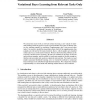Free Online Productivity Tools
i2Speak
i2Symbol
i2OCR
iTex2Img
iWeb2Print
iWeb2Shot
i2Type
iPdf2Split
iPdf2Merge
i2Bopomofo
i2Arabic
i2Style
i2Image
i2PDF
iLatex2Rtf
Sci2ools
110
click to vote
ECML
2007
Springer
2007
Springer
Learning from Relevant Tasks Only
We extend our recent work on relevant subtask learning, a new variant of multitask learning where the goal is to learn a good classifier for a task-of-interest with too few training samples, by exploiting “supplementary data” from several other tasks. It is crucial to model the uncertainty about which of the supplementary data samples are relevant for the task-of-interest, that is, which samples are classified in the same way as in the task-of-interest. We have shown that the problem can be solved by careful mixture modeling: all tasks are modeled as mixtures of relevant and irrelevant samples, and the model for irrelevant samples is flexible enough so that the relevant model only needs to explain the relevant data. Previously we used simple maximum likelihood learning; now we extend the method to variational Bayes inference more suitable for high-dimensional data. We compare the method experimentally to a recent multi-task learning method and two naive methods.
ECML 2007 | Irrelevant Samples | Machine Learning | Supplementary Data | Supplementary Data Samples |
Related Content
| Added | 07 Jun 2010 |
| Updated | 07 Jun 2010 |
| Type | Conference |
| Year | 2007 |
| Where | ECML |
| Authors | Samuel Kaski, Jaakko Peltonen |
Comments (0)

